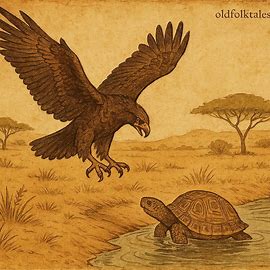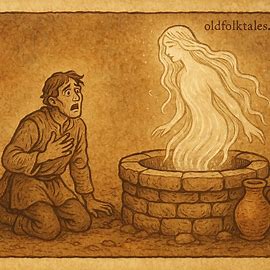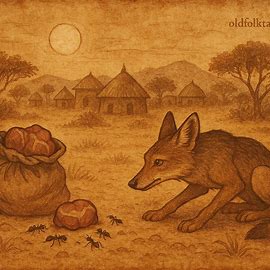In a land where the desert winds carried both blessings and curses, there lived a man and his wife who had been blessed with seven strong sons. The family was content, but fate had one more gift in store for them.
One bright morning, the seven brothers prepared for their hunting expedition, shouldering their spears and gathering their provisions. Before departing, they approached their aunt with careful instructions. “Watch over our mother,” the eldest said, his eyes serious. “If she bears a daughter, wave a white handkerchief high in the air, and we shall return immediately to celebrate. But if another son joins our ranks, wave a sickle, and we will continue our hunt.”
The brothers disappeared into the wilderness, their figures growing smaller against the vast horizon. Soon after, their mother gave birth to a beautiful daughter, her cries filling the house with joy. The aunt held the white handkerchief in her hands, feeling its soft fabric between her fingers. But jealousy had taken root in her heart like a poisonous weed. She desired the peace that would come with the boys’ absence, so she raised the sickle high instead, its metal blade glinting in the sunlight.
Read: The Story of Arab-Zandiq
The daughter was named Udea, and she grew into a lovely young woman, her laughter brightening her parents’ home. She lived her early years in blissful ignorance of the brothers she had never met, until one cruel day when an older child’s taunting words shattered her innocent world.
“You drove your brothers away!” the child sneered. “They wander the earth because of you, never to return home!”
Udea’s heart broke at these words. She ran to her mother, tears streaming down her face, demanding the truth. Her mother, overcome with grief and guilt, revealed the tragic deception that had separated their family.
Determined to reunite with her lost brothers, Udea prepared for a perilous journey. Her mother, though heartbroken to see her daughter leave, equipped her with everything she could: a sturdy camel for the long desert crossing, provisions for many days, and a magical cowrie shell to wear around the camel’s neck as protection. Most importantly, she assigned Barka, an African servant, and his wife to accompany and protect Udea on her quest.
The first day of travel passed peacefully under the endless sky. But on the second day, Barka’s true nature began to emerge. “Get down from the camel,” he commanded Udea harshly. “My wife is tired and needs to ride.”
Fortunately, Udea’s mother had followed at a distance and heard Barka’s unreasonable demand. “Leave the girl alone, Barka!” she called out firmly, and he reluctantly obeyed.
By the third day, they had traveled far from home, and Udea’s mother could no longer hear their voices across the vast distance. Once again, Barka ordered Udea to dismount. When she refused, explaining that the camel was hers, Barka’s anger erupted. He seized the girl and threw her roughly to the ground, her body hitting the hard earth with a sickening thud. His wife climbed onto the camel without a glance at the injured girl.
From that day forward, Udea walked on foot across the merciless terrain. The sharp stones cut her bare feet until they bled, leaving a trail of pain behind her. She called out desperately for her mother, but only the wind answered her cries.
After many days of suffering, they encountered a traveling caravan whose members spoke of a magnificent castle where seven brothers lived. Hope flickered in Udea’s heart like a candle in the darkness. As they approached the castle, Barka allowed her to ride the camel again, but his cruelty knew no bounds. He smeared thick, black pitch all over her skin, disguising her true appearance so thoroughly that even her own brothers might not recognize her.
When they arrived at the castle gates, the seven brothers welcomed the mysterious black-skinned visitor without question, their hearts generous despite their inability to see through the disguise. Udea’s joy at finally meeting her brothers was so overwhelming that tears poured down her face, leaving white streaks through the pitch like rivers cutting through dark earth.
One brother noticed these strange white marks and, alarmed, took a cloth to rub at her face. As the pitch came away, revealing her true skin beneath, he gasped in recognition. “Sister,” he whispered, “who has done this terrible thing to you?”
At first, Udea remained silent, too afraid of Barka’s retribution to speak. But her brothers’ gentle persistence finally broke through her fear, and she told them everything, the deception, the journey, and the cruelty she had endured. The seven brothers’ rage was swift and terrible. Without hesitation, they executed both Barka and his wife for their crimes against their beloved sister.
Now reunited, the brothers prepared for their next hunting expedition. Before leaving, they gave Udea careful instructions for her safety. “Lock yourself in the castle,” they said, “and take guidance only from the cat who has grown up within these walls. Trust the cat’s wisdom in all matters, and eat nothing that the cat does not first taste.”
They also told her about the magical castle elves and the special pigeons who served as messengers. “If you are ever in danger,” they explained, “these pigeons can fly to us no matter how far we’ve traveled. We leave them seven days’ worth of food and water before each hunt.”
Udea, with her kind heart, questioned this practice. “Why not let me feed them fresh food daily? Surely seven-day-old provisions must grow stale and unpleasant.”
Her brothers agreed to this wise suggestion, telling her that any kindness shown to the pigeons would be considered kindness to themselves.
On their third hunting trip, disaster struck through a moment of forgetfulness. While cleaning the castle, Udea discovered a single bean and, without thinking, popped it into her mouth. The cat immediately demanded half of that exact bean, but Udea explained that she had already swallowed it. She offered one hundred other beans in compensation, but the cat wanted only the one she had eaten.
To punish her disobedience, the cat extinguished all the fires in the kitchen. With no way to cook food, Udea climbed to the castle’s highest tower and spotted a distant fire. Desperate, she set out to find its source.
The fire belonged to an elderly man, but his appearance deceived her, he was actually a dreaded man-eater. When Udea asked for a burning coal, he demanded a horrific price: a strip of her flesh from ear to thumb. With no choice, she agreed, bleeding profusely as she made her way home.
A raven followed her bloody trail, but when Udea noticed it and cursed at the bird in her startled fear, the raven spoke: “Why do you wish harm upon one who has helped you?” With those words, it flew away, taking with it the dirt it had used to cover her trail of blood.
Now the man-eater could follow the blood directly to the castle. For six terrifying nights, he broke down six doors, coming closer to Udea each time. On the seventh day, with only one door remaining between her and certain death, Udea sent an urgent message to her brothers through the castle pigeons.
The brothers received her desperate plea and rushed home immediately. They arrived just in time to trap the man-eater in a burning pit, where he perished in the flames.
But even in death, the man-eater’s evil endured. As his body burned, a single fingernail was carried by the wind and pierced Udea’s own fingernail. She collapsed instantly, lifeless.
Heartbroken, the brothers placed their sister’s body on a bier, loaded it onto a camel, and sent it toward their parents’ home. They commanded the camel to avoid all capture and to stop only when someone spoke the word “string.”
During the journey, three men chased the camel, but it continued running until one of them cried out that his sandal string had broken. The camel stopped, and when the man reached for Udea’s hand to remove her ring, his touch dislodged the evil fingernail. Udea’s eyes opened, and life flowed back into her body.
The camel carried the revived Udea back to her overjoyed brothers, and together, the eight siblings journeyed home to their parents. On the fourth day of their joyful reunion, the eldest brother revealed their aunt’s treachery and recounted all the adventures that had shaped their lives.
The Moral of the Story
This tale teaches us that jealousy and deception can tear families apart, but love, determination, and loyalty can overcome even the greatest obstacles. Udea’s courage to seek out her brothers, despite the dangers she faced, shows us that family bonds are worth fighting for. The story also reminds us that kindness to others even to animals and magical creatures is often rewarded, while cruelty ultimately leads to destruction.
Knowledge Check
Q1: Who is Udea in this African folktale? A: Udea is the daughter of a couple who had seven sons. She grew up not knowing about her brothers because her aunt’s deception caused them to remain away from home, believing their parents had another son instead of a daughter.
Q2: What role does the aunt play in separating the family? A: The aunt betrays the family by waving a sickle instead of a white handkerchief when Udea is born. The brothers had instructed her to wave a white handkerchief if their mother had a daughter (signaling them to return) or a sickle if she had a son (signaling them to continue hunting). Her jealousy and desire for peace led to years of family separation.
Q3: What symbolic meaning do the castle cat and pigeons represent? A: The cat represents wisdom and protective guidance,Udea is instructed to follow its advice and eat only what it approves. The pigeons symbolize communication and rescue, serving as magical messengers that can summon help in times of danger. Both creatures embody the theme that respecting and showing kindness to others brings protection and aid.
Q4: How does Barka’s treatment of Udea reflect themes of betrayal in the story? A: Barka’s abuse mirrors the aunt’s earlier betrayal both are trusted protectors who cause harm instead. Barka throws Udea from her camel, forces her to walk on sharp stones, and disguises her with pitch to prevent recognition. His cruelty represents how those meant to protect can become sources of suffering.
Q5: What is the significance of the man-eater’s fingernail in the story? A: The man-eater’s fingernail represents how evil can persist even after death, causing harm through the smallest remnant. When it pierces Udea’s fingernail, it brings death, but its removal through an act of human touch (the man trying to steal her ring) restores life, showing how human connection can overcome dark magic.
Q6: What cultural values does this African folktale emphasize? A: The story emphasizes family loyalty, hospitality, the consequences of jealousy and deception, respect for nature and animals, and the belief in protective magic. It reflects African storytelling traditions that often feature talking animals, magical elements, and moral lessons about treating others with kindness and maintaining family bonds despite obstacles.






